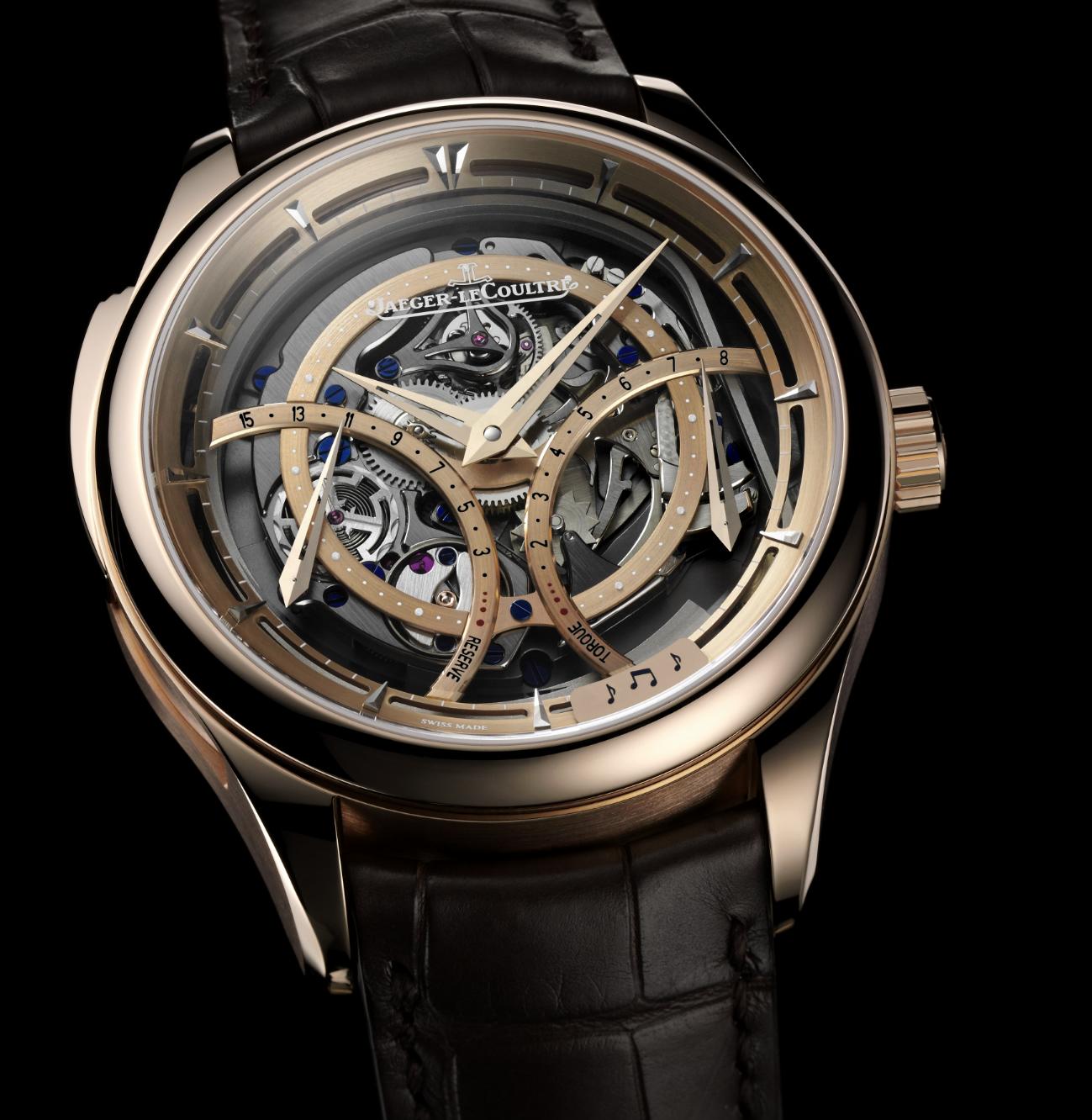Jaeger-LeCoultre – Masterful Minute Repeater
In 2005, the launch of the Master Minute Repeater Antoine LeCoultre (Calibre 947) had already created a sensation with its patented crystal gong, constituting a major breakthrough in the world of watch sound. The gong heel was soldered to the watch’s sapphire crystal so as to make the most of the sapphire crystal’s properties of velocity to magnify the intensity and purity of the sound vibrations emitted.
After several years of research aimed at creating the purest sound possible, Jaeger-LeCoultre perfected a totally new shape of gong, used for the first time ever on the Master Minute Repeater watch in 2007. Consisting of a single part extending from the heel to the actual gong itself, this new design has a square cross-section rather than the traditional round cross-section, and a larger surface area that comes into contact with the hammer, which for its part can also strike with increased force. The gongs meanwhile were made out of a material for which Jaeger- LeCoultre possessed, and still possesses, the exclusive and confidential formula.
A succession of technical innovations were inspired by the Calibre 947, which consolidated its place in the history of watch sound when in 2009 Jaeger-LeCoultre unveiled the first minute repeater watch with a two-week power reserve combined with a regulator display.
The magnitude of the project that the watchmakers had taken on gradually revealed itself during the course of a series of detailed studies undertaken with a view to achieving a sound hitherto unknown for a minute repeater watch. The first priority was to define the characteristics of the sound required and to establish parameters for it.
Sound is made up of four main components.
The volume is the strength of the sound as it is perceived. Expressed in decibels, it represents the sound pressure level to which the ear is exposed. It is a direct function of the acoustic pressure exercised on the eardrum. A variation of 10 decibels represents a doubling of the pressure exercised on the eardrum, and therefore a doubling of the perceived volume.
The second component of a sound is its duration. This represents the time that elapses until the sound emitted loses 20 decibels. The durations measured are of the order of a few hundred milliseconds.
The two other characteristics of a sound are its richness and pitch. The richness depends on the number of partials (or tones) perceived. The higher the number of partials, the more the sound is colourful and harmonious. The pitch corresponds to how high and harmonious is the value of the note struck, and to the respect for the principle of a third between two notes.
At the Manufacture, all measurements are taken using a microphone placed at a given distance from the sound source, but also with the assistance of a laser so as to obtain measurements that are not disturbed by the ambient medium.
Jaeger-LeCoultre specialists have studied each of these parameters so as to obtain the best possible combination. The result is quite simply breathtaking. The Jaeger-LeCoultre Master Grande Tradition à Répétitions Minutes produces a sound that has never been heard before in a wristwatch. With 64 decibels, durations of over 600 milliseconds and a richness of 9 partials, the sound produced surpasses any performance previously obtained with a wristwatch.
Even the least musically-inclined listener will immediately notice the difference.
While minute repeater construction is a subjective art form at some companies, at Jaeger-LeCoultre it is absolutely a science. The Vallée de Joux manufacture can produce sheaves of research results on what constitutes optimum sound, and how to reproduce it on a consistent basis. Also typical of their approach has been to use new mechanical constructions—like the first silent regulators of the late 19th century—to get the best acoustic results. Their latest Master Grande Tradition à Répétition Minutes ($287,700) includes several of these. Like the brand’s recent-generation repeaters, the gongs are anchored to the crystal for amplification. This model also contains the flat-faced gongs Jaeger-LeCoultre explored in its Grande Sonnerie a few years ago.
---------------------------------
Technical specifications:
Movement
• mechanical hand-wound movement,
Jaeger-LeCoultre Calibre 947, crafted, assembled and decorated by hand
• 21,600 vibrations per hour
• 15-day power reserve
• 413 parts
• 43 jewels
• 8.95 mm in height
• 34.7 mm in diameter
Functions
• hours, minutes, minute repeater, power reserve, barrel torque indication
Dial
• gold-plated, openworked
• rhodium-plated applique markers Hands
• dauphine type Crown and push-piece
• 1 crown for winding the watch, and for setting the hours and minutes
• 1 catch to activate the minute repeater
Case
• ø 44 mm, thickness: 15.6 mm
• 18-carat pink gold
• sapphire crystals
• water-resistance: 5 bar
Straps
• chocolate-brown alligator-skin strap with pin buckle in 18-carat gold
Reference
• Q50125 50 18-carat pink gold
---------------------------------------------------------------------
www.facebook.com - Jaeger-LeCoultre
---------------------------------------------------------------------------------
www.Jaeger-LeCoultre.com



No comments:
Post a Comment